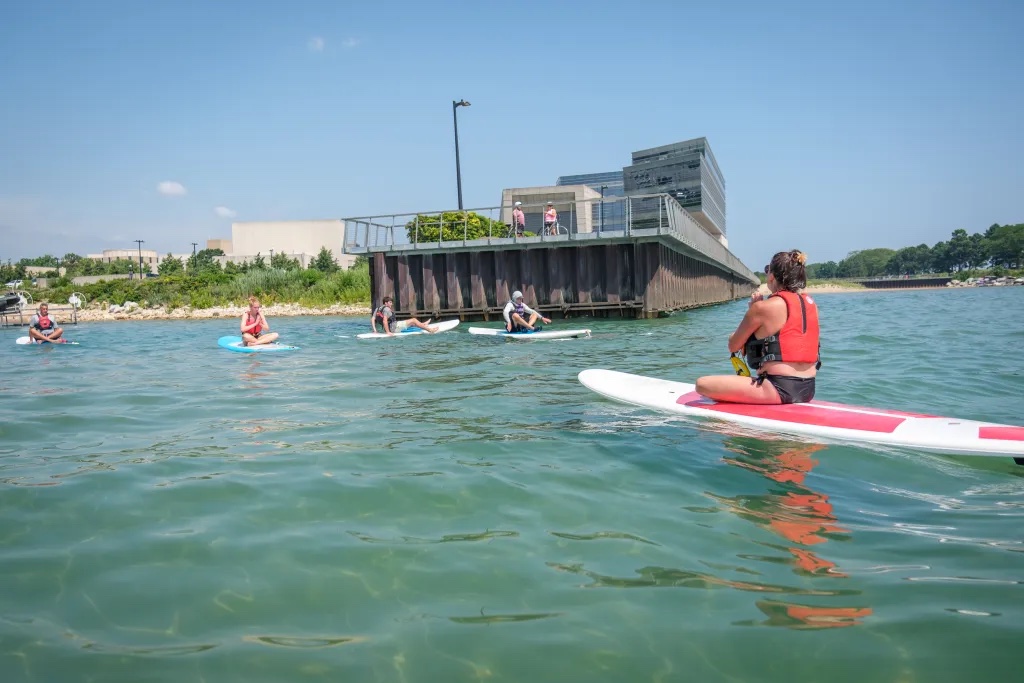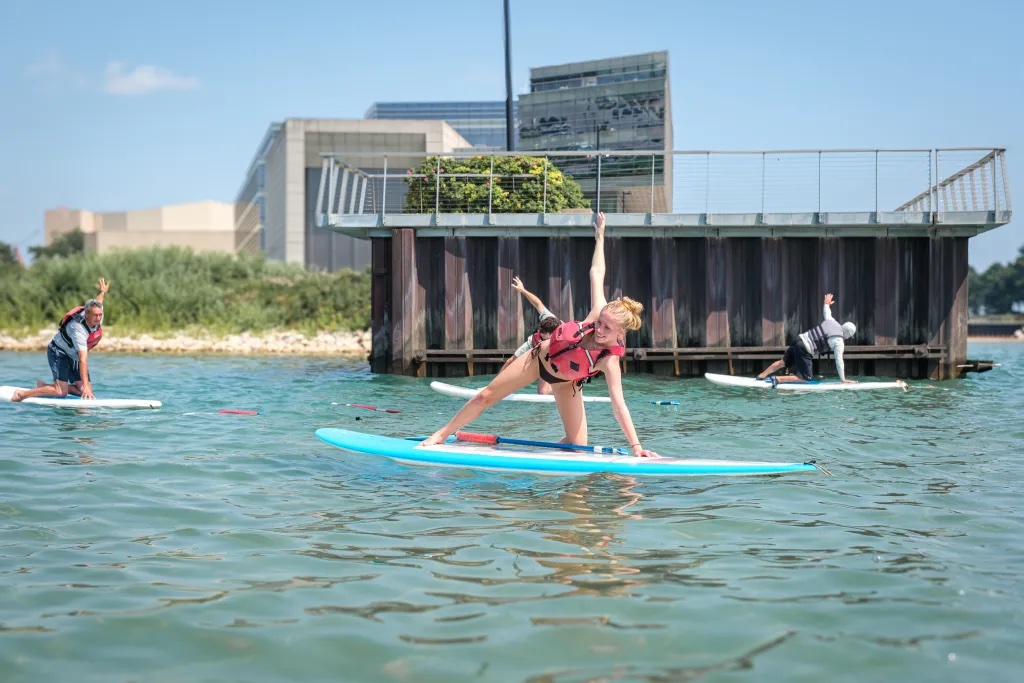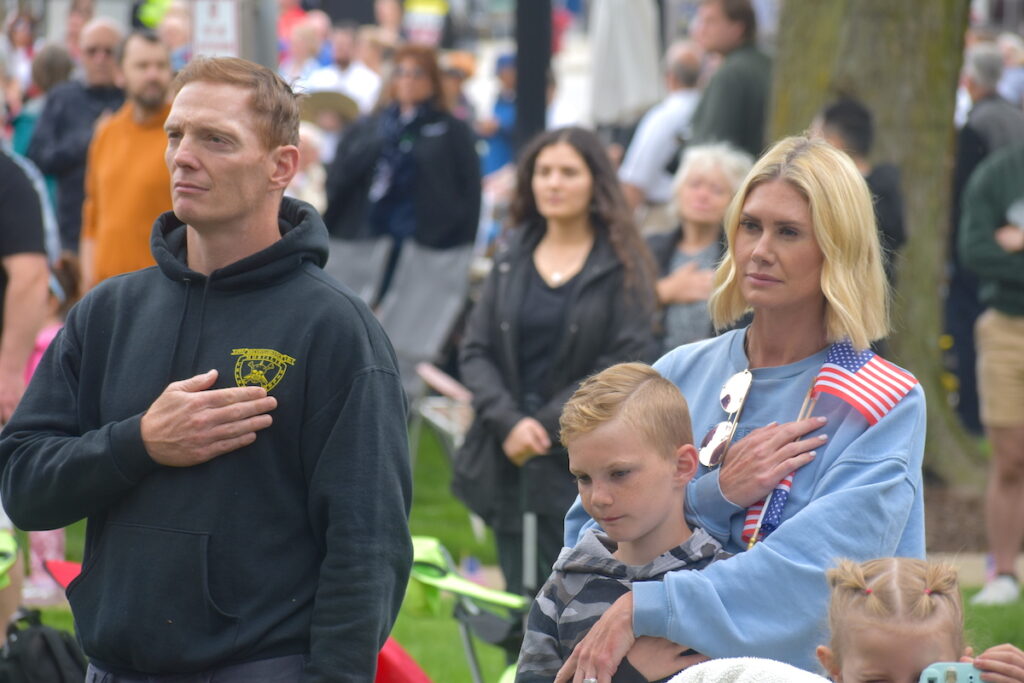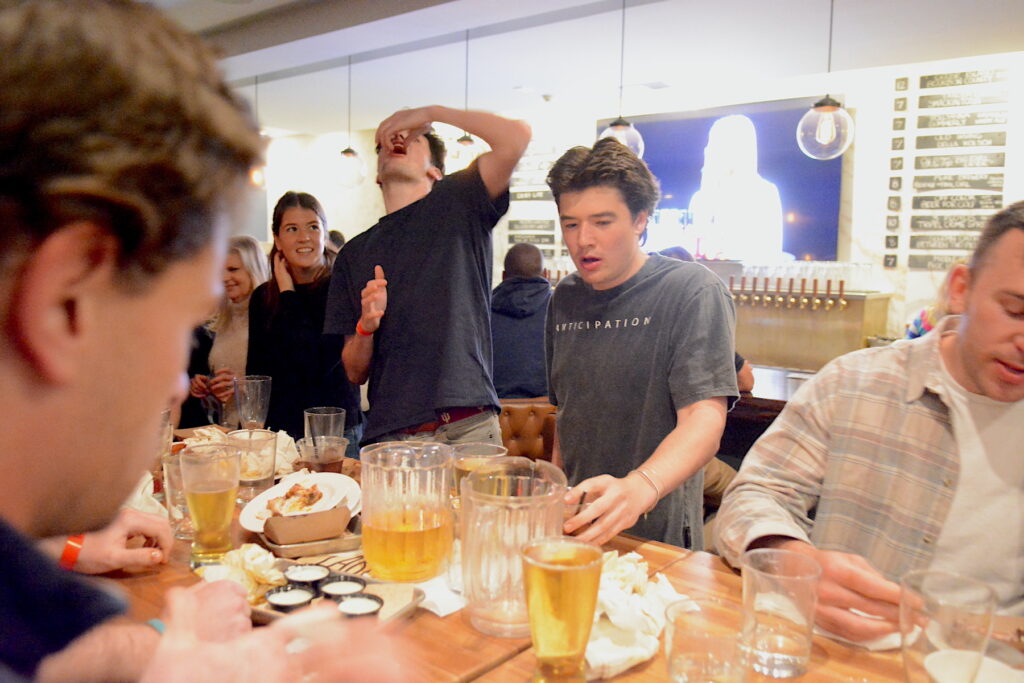
Well Being: Wilmette instructor’s stand-up paddleboard yoga is a practice in mindfulness
(Editor’s Note: This story was written by Carrie Jackson for a regular column called “Well Being” that was originally published in the Evanston Roundtable, a neighboring independent newsroom. It was shared with The Record as part of an ongoing collaborative effort.)
Combining the flow of yoga with the stability of stand-up paddleboarding, SUP yoga is a unique way to get moving on the open water. Kristin Andrews, who owns new yoga studio Karma Collective in Wilmette, has been teaching SUP yoga classes at Northwestern University Sailing Center for more than a decade and said the exercise is primarily a lesson in mindfulness.
“Practicing yoga on Lake Michigan opens up room for summer fun, a few good laughs and truly experiencing the moment in the present,” Andrews said.
Andrews, who is also a massage therapist at In Fine Fettle, has taught traditional yoga since 2004 and recently opened Karma Collective in Wilmette. A lifelong lover of the water, she discovered stand-up paddleboarding on a trip to California in 2012, when a surfer friend took her out on the ocean.
“I was on the open water, surrounded by dolphins, with breathtaking views. I had never experienced anything like it and was immediately hooked,” she remembered.
Andrews combined her two passions and began teaching SUP yoga at Northwestern University Sailing Center the next year. She said that practicing on Lake Michigan is a uniquely humbling experience.
“There is no room for ego, judgment or expectations when you are doing poses on a foundation that is in constant motion,” she said. “Especially on the open water, with changing wind and waves, you learn to focus. When you’re on the board, whether you’re doing downward facing dog or a low lunge, it’s really hard for your mind to wander.”
Classes begin with a brief demonstration on how to use the paddle and board, and participants are outfitted with personal flotation devices. The group then paddles out to waist-deep water, where they tether the board to an anchor for stability.
“Given the unpredictable behavior of the water, safety is our number one concern,” Andrews said. “The sailing center also does a head count every 15 minutes of all participants to make sure everyone is accounted for.”

Once everyone is settled on the board, Andrews starts the group in child’s pose, a basic stretch that helps to open up the back, hips and thighs.
“Child’s pose is a very grounding move that helps participants to feel their place on the board and on the water,” she said. “From there, we progress through a series of poses including warrior two, downward dog and tree pose. I vary the practice depending on the skill level and interests of the individual participants.”
Class progresses to free time, and an opportunity for students to experiment on their own.
Andrews said that while some truly test themselves with challenging poses, others are quite content to sit on the board and soak up their accomplishments.
“Sometimes even facing their fears and getting to class is enough, and I let them have that time for reflection,” she said. “The last 10 minutes is an extended savasana, or resting pose, to lead the body and mind into a place of deep relaxation. Juxtaposed with the water and the breeze, it’s quite a visceral experience.”
Andrews gears each class toward the needs of her students, and beginners are welcome.
“Participants don’t need to have any background with yoga or SUP,” she said. “Doing yoga on a board is not the same as practicing on a mat. You are using different muscles for stability and engaging not just your core but basically every muscle in your body. In a low lunge, for example, you’re squeezing your inner thigh instead of letting it stay passive.”
For novices and seasoned yogis alike, the class is often a confidence boost.
“Sometimes people do a pose on a board they can’t do in a traditional yoga class. They feel empowered, and it helps them experience a pose in a completely different way,” Andrews said.
The group setting encourages students to push themselves if they so desire.
“Nobody wants to fall, but as soon as the first person does, everybody relaxes a little bit,” Andrews said. “That wouldn’t happen if you were doing this solo. Students encourage each other and build off their classmate’s accomplishments. If they see one person try tree pose, they think that maybe they can do it themselves.”
The location on Lake Michigan is both serene and stimulating. While Andrews finds the outdoor backdrop to be a sacred setting, she lets everyone have their own journey.
“I feel being in nature is very spiritual, but I wouldn’t label that for everybody’s experience,” she said. “While I personally feel better when I’m outside, it’s very individual. Studies do show, however, that spending time in nature helps to reduce stress and increase our feel-good serotonin levels.”
With constant stimuli coming from all directions, SUP yoga is undoubtedly a mindfulness practice.
“On the open water, there are distractions from the wind, waves, other boats and so much more,” Andrews said. “You’re taking it all in while trying to literally stay grounded on the board, not fall off and move your body into a tricky balance. Once your mind starts wandering, that’s when you fall. It truly keeps you grounded in the present moment.”
Besides group classes, Andrews also leads private events including birthdays, bridal showers and corporate events.
“SUP yoga is a bucket list item for many people, but it’s also a unique way to spend time with family, friends and coworkers,” she said. “We have father-daughter duos looking for a fun afternoon together, and businesses searching out team-building exercises.”
Andrews reminds her students that at the end of the day, this is not a serious endeavor: “SUP yoga is all about trying something new, facing your fears and embracing what we can’t control. Never underestimate the power of having fun, and sharing a few good laughs.”
Editor’s Note: This column offers ideas and inspirations for using movement as a tool for cultivating overall wellness. We highlight programs and people who create their own community through physical activity and in the process also find social, emotional, mental or spiritual fulfillment. If you have a suggestion, please email Carrie@EvanstonRoundTable.com.


